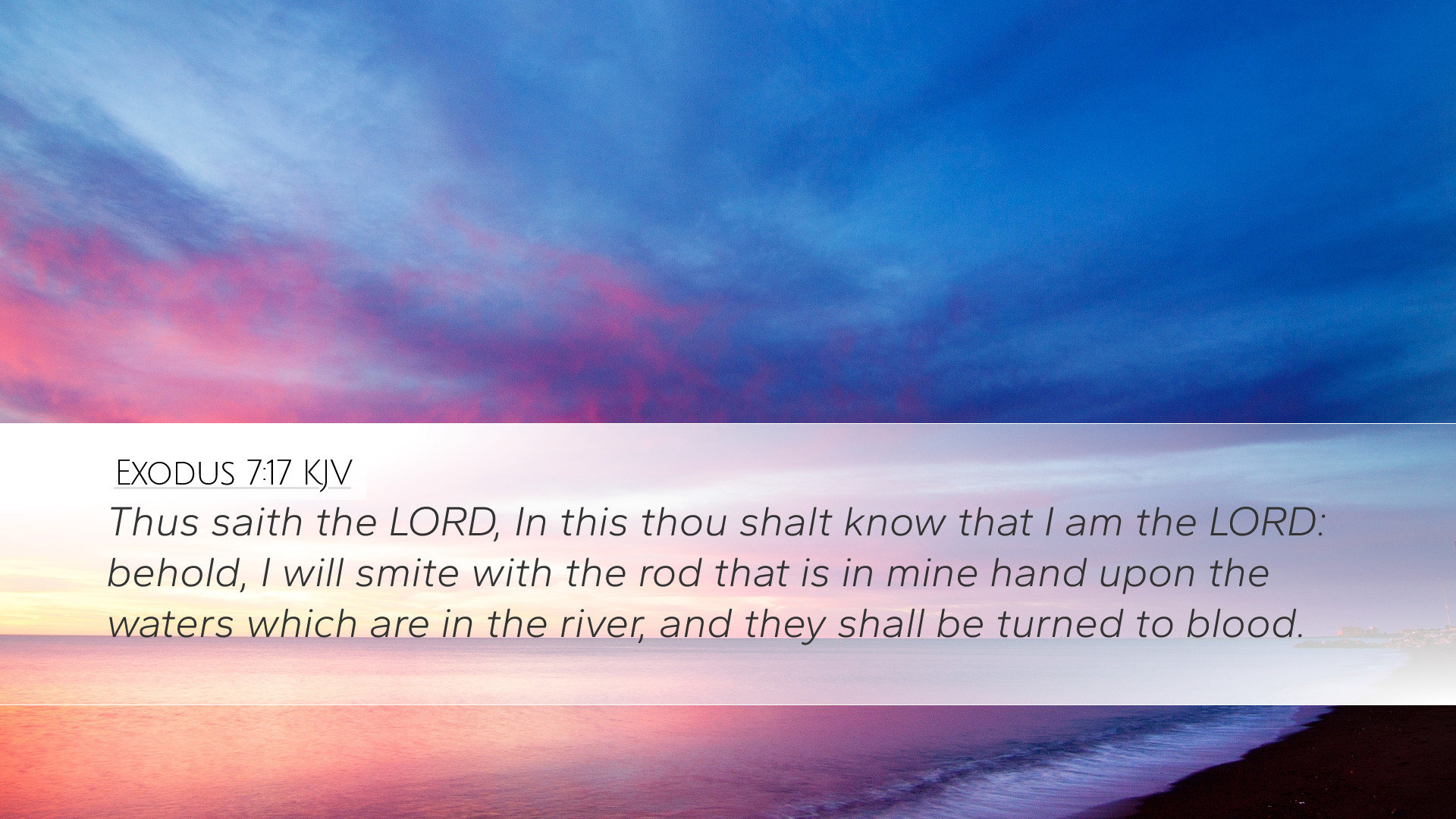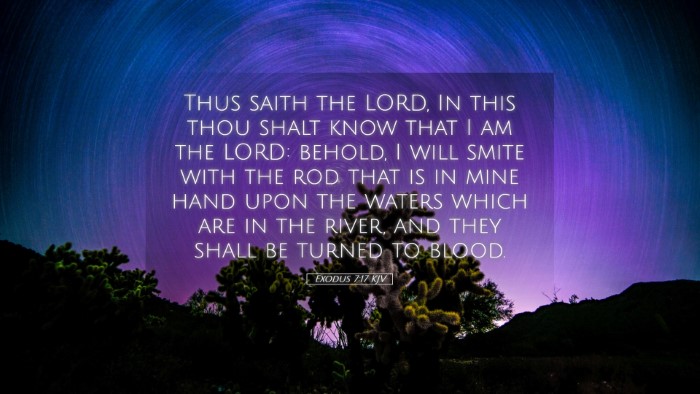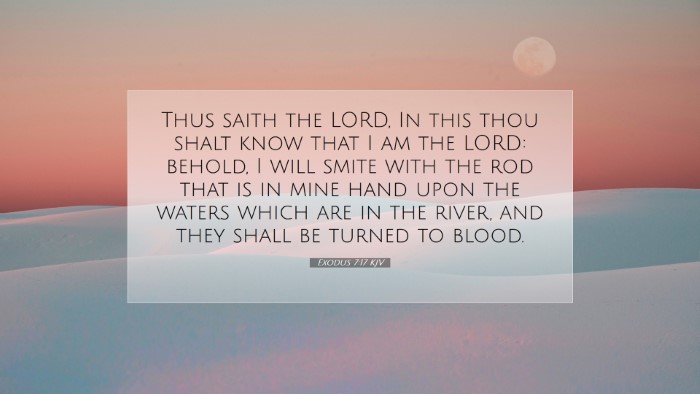Exodus 7:17 Commentary
Bible Verse: "Thus says the Lord: 'By this you shall know that I am the Lord. Behold, I will strike the waters that are in the river with the rod that is in my hand, and they shall be turned to blood.'" (Exodus 7:17, NKJV)
Introduction
This passage is a significant introduction to the series of miracles that God employs to liberate the Israelites from Egyptian bondage. The significance of this verse lies in its demonstration of God's sovereign power over nature and the elements, as well as His intention to reveal both His identity and intentions to Pharaoh and the people of Egypt. In the commentary that follows, insights from Matthew Henry, Albert Barnes, and Adam Clarke will be synthesized to provide a comprehensive understanding of this momentous declaration.
Contextual Background
The context of Exodus 7:17 necessitates an understanding of the broader narrative encapsulated within the plagues. Moses, chosen as the deliverer of Israel, has been given a message from God to communicate to Pharaoh, who in his pride and obstinacy, has repeatedly refused to heed God’s commands.
- Moses’ Commission: Exodus 3-4 recounts Moses’ divine commission at the burning bush, where God makes it clear that he will use signs and wonders to demonstrate His power.
- God’s Assurance: In preceding chapters, the Lord assures Moses of His support and the eventual deliverance of Israel.
- Pharaoh’s Hardness: This verse marks a pivotal moment where God’s intention to confront Pharaoh’s hardened heart begins to unfold.
Divine Authority and Knowledge of God
In Exodus 7:17, God announces that the impending miracle is a sign of His authority. Matthew Henry notes that the phrase "thus says the Lord" is a command that establishes divine authority, serving as a precursor to the miraculous sign that follows. By stating that they would know He is the Lord, God is not simply identifying Himself but is also demonstrating His power and warning against further rebellion.
Albert Barnes emphasizes the necessity of this divine confrontation as it serves to make known to both Pharaoh and the Egyptian people that the God of Israel is not a mere local deity but the God of all creation with the power to control nature.
The Rod and Its Symbolism
The rod that Moses carried is essential in this account and holds symbolic weight. Adam Clarke explains that the rod represents God’s power. It is the instrument of judgment against Egypt and serves as a tool for miracles intended to compel a response from Pharaoh. The rod’s transformation of water to blood is not only a demonstration of divine authority but also symbolizes the impending judgment upon a nation that has oppressed God's people.
The Plague of Blood
The specific miracle of turning the waters of Egypt to blood signifies several things:
- Judgment: This act serves as a direct judgment against the Egyptian gods associated with the Nile and water sources.
- Awakening: It is intended to be a wake-up call for Pharaoh and the Egyptians, prompting them to acknowledge the power of the God of Israel.
- Supreme Authority: This act emphasizes God’s total authority over life-sustaining resources, as the Nile was vital for Egyptian agriculture and survival.
Theological Implications
The spiritual undercurrents of this passage are profound. It highlights God’s ability to orchestrate events for His divine purposes. Believers today can draw from Matthew Henry’s reflections on God’s desire for His followers to recognize His sovereignty. This verse illustrates how God reveals Himself through acts of power, calling His people to trust Him amidst adversity.
Furthermore, it serves as a reminder that divine authority commands respect, and the consequences of rebellion against that authority lead to inevitable judgment. This is echoed in Adam Clarke’s assertion that God’s judgments are not arbitrary but are tied to His character and purpose in history.
Practical Application for Today
In considering Exodus 7:17, pastors, students, and theologians should reflect on the relevance of this miraculous sign for contemporary faith. The narrative reinforces the importance of recognizing and responding to God’s sovereignty in our lives. The turning of the Nile into blood can symbolize the various ways God intervenes in our personal and communal existence, calling us to repentance and transformation.
- Cultivating Awareness: Believers are encouraged to cultivate a spiritual awareness of God’s presence and His authoritative role in the world.
- Response to Divine Signs: Just as Pharaoh was called to respond to God’s signs, modern believers are invited to respond to God’s leading and interventions in their lives.
- Warning to the Disobedient: There is a sobering reminder here that rejection of God’s commands can lead to judgment; this calls for ongoing repentance and submission to His will.
Conclusion
Exodus 7:17 is a pivotal verse that frames the unfolding narrative of the ten plagues against Egypt. Drawing insights from the commentaries of Matthew Henry, Albert Barnes, and Adam Clarke enriches our understanding of God’s intentions and the theological implications of His actions. As we engage with this text, we are invited into a deeper encounter with God’s sovereignty, His authority over creation, and the necessity for a rightful response to His revealed power. May these reflections guide pastors and scholars alike in their teachings and studies, finding relevance in the eternal truth of God's Word.


